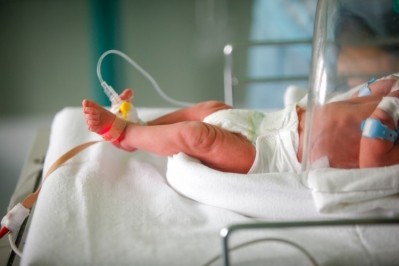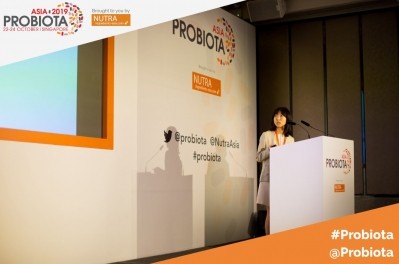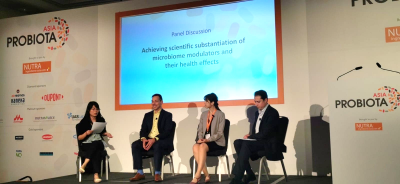Probiota Asia 2019
Mother-baby link: Probiotic intake during pregnancy improves infant immunity by reducing risk factors

The findings were presented by Dr Anders Henriksson, application and technical support leader of human health at DuPont Nutrition & Biosciences, when he was presenting at our Probiota Asia summit held in Singapore recently.
A risk factor that can affect infants’ immunity and later part of their lives is gestational diabetes mellitus (GDM) in pregnant mothers.
A systematic review has shown that the offspring of GDM mothers have higher blood glucose levels and obesity.
However, a randomised controlled trial by the firm in New Zealand showed that supplementing L. rhamnosus HN001 during early pregnancy may reduce the prevalence of GDM.
A total of 423 subjects took part in the study, with about half of them supplemented with the probiotic from the first trimester to six months after birth.
Findings showed that the probiotic reduced the risk of GDM most effectively in mothers above the age of 35.
For instance, in mothers older than 35 years old, their prevalence of GDM was 7.1%, while that of the placebo was 22.9%.
The effect of the probiotic was less obvious in mothers younger than 35 years old, with the prevalence of GDM in both placebo and treatment group between 8.5% and 8.8%.
Probiotic supplementation also helped to prevent future episodes of GDM.
For mothers who have a previous history of GDM, the prevalence of GDM dropped to 0% in the treatment group, while the rate of prevalence was as high as 87% in the placebo group.
Infants’ immune health
Besides managing GDM, the effects of L. rhamnosus HN001 supplementation during pregnancy was also extended to the infants.
In a 2006 study, the mothers were given L. rhamnosus HN001 in the later stage of their pregnancy until six months after giving birth.
Findings showed that these mothers have a higher level of immune market IFN-gamma in their cord blood.
Individuals suffering from allergic symptoms typically have lower levels of IFN-gamma.
“When it comes to newborns, we also know we have the immuno-opportunity.
“We know that the gut microbiome is established within the first couple of years, the first two or three years and that the gut microbiome that's established will have an impact on the immunity.
“If we administer these particular probiotic strains to mothers during pregnancy, it will bring some significant benefits for the health of the newborns,” Henriksson explained.
Supplementing infants with L. rhamnosus HN001 can also provide direct benefits.
In the same study, the infants were fed with the same probiotic strain until 20 years old, and immune problems, such as wheezing, atopy, and hay fever were monitored.
In the case of eczema, the treatment group experienced a 42% lower cumulative prevalence over the first 11 years of life.
Reducing risks of pre-term birth
Studies conducted by the firm also showed that probiotics intake can act as an adjunctive in alleviating periodontitis and improving vaginal microbiome, both of which play a role in causing preterm birth.
For alleviating periodontitis, a human study published last year found that Bifidobacterium lactis HN019 supplementation as an adjunctive to scaling and root planing (SRP) was effective.
Forty-one mothers over 30 years old suffering from periodontitis were recruited for the study.
The treatment group consumed a lozenge containing 1bn CFU of Bifidobacterium lactis HN019 twice per day for 30 days.
Results showed that the treatment group presented a decrease in probing pocket depth and a clinical attachment gain significantly higher than the control group at 90 days.
The treatment group also had fewer periodontal pathogens of red and orange complexes.
On other hand, probiotics intake can also modulate vagina microbiome, in turn, preventing a dysbiotic vagina microbiome and reduce risks of preterm birth.
A study published earlier this year showed that a combination of L. rhamnosus HN001 and L. acidophilus La-14 can reduce the symptoms of vaginal discharge and itching.
Conducted in Brazil, 48 women with recurrent bacterial vaginosis took part in the study. The treatment group was given a combination of HN001 and La14 with lactoferrin as an adjunctive therapy to metronidazole medication.
Findings showed that the population levels of rhamnosus and acidophilus had increased.
“This shift in population levels to more predominant levels of lactobacillus had been shown to change the nugent score, which is expected to have an effect on the severity and prevalence of bacterial vaginosis,” Henriksson said.
Post-natal depression and anxiety
The concept of the gut-brain axis also means that probiotics can be potentially used to address problems such as post-natal depression and anxiety.
Henriksson pointed out that safe, effective therapies were needed, as women were often reluctant to take anti-depressant medication during pregnancy or while breastfeeding.
In a study published in 2017 on 423 women with postnatal depression and anxiety, it was shown that L. rhamnosus HN001 has an effect on improving the psychological outcomes.
Findings showed that the number of women with depressed symptoms was lower in the treatment group at 16.5% as compared to the placebo at 23.5%.
Fewer women from the treatment group also said they felt anxious at 15.6% as compared to the placebo at 29.4%.
In conclusion, he said that there were opportunities for product development, could be for mothers, new-borns, preparation for reducing risks of pre-term births
Sources:
Pediatric Allergy, Immunology, and Pulmonology
Effects of Lactobacillus rhamnosus HN001 in early life on the cumulative prevalence of allergic disease to 11 years
DOI: 10.1111/pai.12982
Authors: Wickens and et al
British Journal of Nutrition
Early pregnancy probiotic supplementation with Lactobacillus rhamnosus HN001 may reduce the prevalence of gestational diabetes mellitus: a randomised controlled trial
Authors: Wickens and et al
Journal of Clinical Periodontol
Effects of Bifidobacterium probiotic on the treatment of chronic periodontitis: A randomized clinical trial.
DOI: 10.1111/jcpe.12995
Authors: Invernici and et al
Beneficial Microbes
Evidence-based mixture containing Lactobacillus strains and lactoferrin to prevent recurrent bacterial vaginosis: a double blind, placebo controlled, randomised clinical trial
DOI: 10.3920/BM2018.0075
Authors: Russo and et al
EBioMedicine
Effect of Lactobacillus rhamnosus HN001 in Pregnancy on Postpartum Symptoms of Depression and Anxiety: A Randomised Double-blind Placebo-controlled Trial
DOI: 10.1016/j.ebiom.2017.09.013
Authors: Slykerman and et al



















